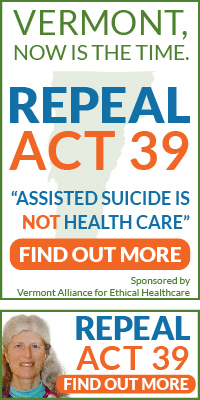Once again the Vermont Legislature is exhibiting an alarming inconsistency on the topic of suicide.
The March 19 Burlington Free Press carries an article about a House resolution discussed March 18 in the Vermont House Committee on General, Housing and Military Affairs. http://www.burlingtonfreepress.com/story/news/politics/2015/03/18/vermont-military-suicide-resolution/24986339/
Proposed as a joint resolution for the House of Representatives and Senate, it is aimed at helping reduce military suicides, and would encourage the Vermont National Guard to reduce stigma surrounding mental health care. The resolution would also recommend federal-level policies, including more training for mental health counselors about military life.
While we offer kudos to Rep. Mark Higley, R-Lowell, and Rep. Vicki Strong, R-Albany, who sponsored the proposal, for their acknowledgment of this very real problem and for their pro-active compassion toward veterans, we fear that their effort is akin to that of the Dutch boy who put his finger in the dike to try to hold back the impending flood. The reality is that as long as Act 39 is in place, Vermont is working against its own efforts to reduce suicide.
Let’s start by addressing the tiresome claim of proponents of assisted suicide that the people who request drugs to end their lives are not committing suicide. The refrain goes something like this, “These are people who want to live. Unfortunately, they know they are dying and they can’t do anything about it. They simply want to control the manner in which they die.”
First of all: We’re all going to die. So let’s just get that off the table. People who have received terminal diagnoses of six months or less to live, have an idea, but not an assurance, of when they will die. However, the reality is that death is before each and every one of us, each and every day of our lives.
Secondly: It could be argued that most, if not all, people who commit suicide would “like to live” if the circumstances that have led them to consider suicide could be adequately dealt with. Like those who use the legal route to end their own lives, they are, in fact, also “choosing to control the manner” in which they die. They are succumbing to a sense of hopelessness about ending the suffering they find themselves enduring—and in fact, their actual suffering may be more acute than that of those who are legally eligible for state-supported suicide.
So, by the definition of the suicide proponents themselves, using a doctor-prescribed dose of lethal medication to end one’s life intentionally is still suicide. It’s just a suicide that society has endorsed and, theoretically made easier to accomplish.
To imagine that legalizing suicide for one purportedly narrowly-defined group of sufferers will not lead to the well-documented phenomenon of suicide contagion among others who are at risk for suicide, is magical thinking. As we’ve reported previously, the statistics speak for themselves:
- In Oregon, where assisted suicide has been legal since 1998, the suicide rate among all populations has risen steadily. The rate of non-assisted suicides, which had been declining for a decade prior to legalization of assisted suicide, immediately began to rise upon legalization, and has continued to do so. In 2010 it was 35% over the national average http://www.oregon.gov/DHS/news/2010news/2010-0909a.pdf. By 2012, it was 41% over the national average https://www.deschutes.org/DeschutesOrg/files/33/33d5338f-6e71-49ca-b6fa-051ac3293a8b.pdf.
- Similarly, Washington State legalized assisted suicide in March 2009, six years ago, and the predictable rise in non-assisted suicide has occurred there as well. (http://mifflin.pa.networkofcare.org/mh/news-article-detail.aspx?id=54947).
As macabre as it is to say this, we must point out that non-legal means of committing suicide seem to be scarily successful in accomplishing the job for those who are determined to end their lives. We oppose suicide in any form, legal or not. However, our battle is against legal suicide, and we are not proposing to impose our views, or eliminate “choice,” for those who insist on carrying out their own deaths. We simply ask that the law not be used to enable and promote it.
Let’s undo the damage we’ve already done, and not wait for the first (or next) Act 39-inspired suicide of a teenager, a military veteran or another person who is at risk.
Repeal Act 39.

